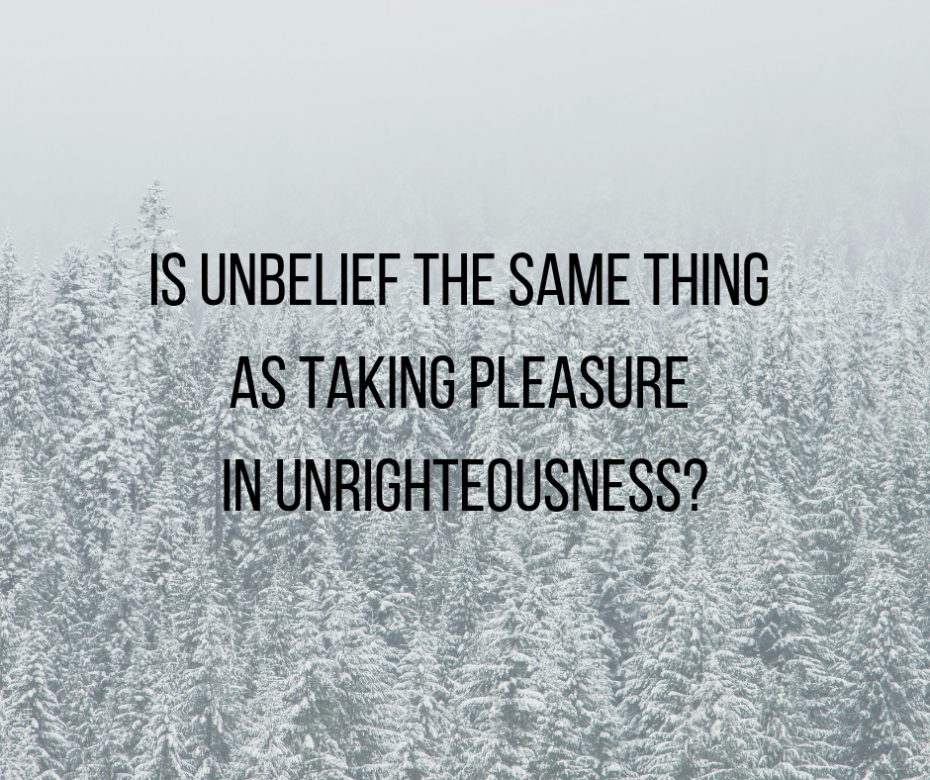Some questions are harder than others:
I’m struggling to reconcile the free grace position with 2 Thess 2:12. Would you please help me understand what Paul is saying? The verse reads: “that they all may be condemned who did not believe the truth but had pleasure in unrighteousness.”
It seems to me that according to this verse, the opposite of believing the truth (which I understand to refer to the gospel) is having pleasure in unrighteousness. If this is true, though, doesn’t that mean you have to turn away from the pleasures of unrighteousness before you can believe the truth? And wouldn’t that contradict the faith alone message? I understand the faith alone message to be: by simply believing on Jesus He gives us eternal life. So you don’t have to turn away from sin in order to have eternal life. I feel convinced of this. But this verse in 2 Thessalonians, to me, seems to be implying that you do.
Any help is greatly appreciated! Thank you so much for your ministry!
I had to consult the commentary I wrote on 2 Thessalonians to see how I explained that verse. Here is what I wrote:
It is not known what the strong delusion will be. But it is known that only unbelievers who did not believe the truth but had pleasure in unrighteousness will be deceived. This does not mean that all of the unsaved when the Rapture occurs will be eternally condemned. Revelation 7:4-17 states that there will be 144,000 Jewish evangelists and that they will lead Jews and Gentiles all over the earth to faith in Christ during the Tribulation.
Those who had pleasure in unrighteousness are people who heard and yet rejected the gospel in this age. Those in tribes and people groups who have not heard the gospel will not be subject to this delusion. Likely even some in countries like the United States, where the gospel is accessible to all, will not have heard the clear gospel, or have not heard it enough, and so some of them will come to faith in Christ in the Tribulation.
Surely, however, a large percentage of people in Christian lands will be deluded when the Rapture occurs and will be hardened in unbelief. Most of the converts of the 144,000 will no doubt be in third-world countries and unreached areas of the world (Matt 24:14).
Unbelievers should not be complacent in their unbelief. They should cry out to God to show them the truth. Their fear of the Tribulation should motivate them to ask God to reveal the truth of the gospel to them (The Grace New Testament Commentary, s.v. 2 Thessalonians, pp. 956-57).
Well, I hint at my view. But I do not directly answer the question at the head of this blog.
First, it should be noted that “that they all may be condemned” might refer to temporal or eternal condemnation. Indeed, the Greek is more accurately translated, “that they all should be judged…” Is Paul here referring to the judgments of the Tribulation wrath? Or is he referring to eternal condemnation in the lake of fire? Or are both in view? I think likely both are in view.
Second, what is the connection between the unbelief and the pleasure in unrighteousness?
Whatever the connection, Paul is not saying that the opposite of believing the truth is having pleasure in unrighteousness. That is just not true. The opposite of believing the truth is not believing the truth.
Paul is saying that two things, not one thing, will be true of these people whom God allows to be deceived by the great deception which will occur. They will be deceived because 1) they “did not believe the truth” and because 2) they “had pleasure in unrighteousness.”
As I mention in my commentary, many unbelievers will come to faith during the Tribulation. So, the fact that someone did not believe the truth will not by itself mean that that person will fall prey to Satan’s deception. Evidently his or her unbelief must be combined with him or her finding pleasure in unrighteousness.
I think Paul is talking about people who prior to the Rapture had clearly heard and strongly rejected the truth (2 Thess 2:10 says “they did not receive the love of the truth that they might be saved”). Such people are those who will be deceived.
Saying that there will be people who “did not believe the truth but had pleasure in unrighteousness” is to state the facts. It is not to state the condition for escaping eternal condemnation, which is faith alone. It does seem, however, to state the condition for them accepting the “strong delusion” (2 Thess 2:11).
Does God harden people like that today in the Church Age? While there is no strong delusion today and thus the situation is different, I do believe He hardens some people. However, if He does, He does so rarely and only in cases in which people have strongly and repeatedly heard and rejected the truth. If Saul of Tarsus was able to come to faith after having rejected the truth so vigorously and viciously for years, any person who is open to God’s revelation is still a candidate for hearing and believing the message of life and being born again.


